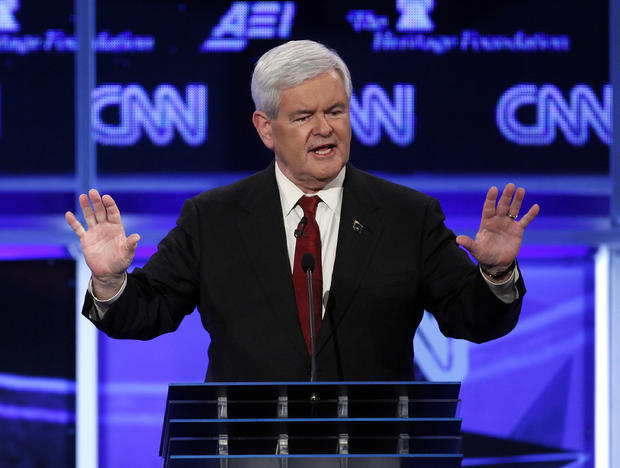Does Newt Gingrich have an immigration problem after the GOP debate?
This post originally appeared on Slate.
Did Newt Gingrich have one idea too many? At the CNN national security debate on Tuesday, the former speaker said that he would not be in favor of kicking out illegal immigrant families that had been in the country for a long time. "The party that says it's the party of the family is going to adopt an immigration policy which destroys families that have been here a quarter century?" he said. "I'm prepared to take the heat for saying, 'Let's be humane in enforcing the law.'" (watch below) Michele Bachmann said Gingrich was offering amnesty. Mitt Romney said Gingrich was offering a "magnet" that would encourage more illegal immigration.
A similar moment almost exactly two months ago started Rick Perry's downfall. He said those who didn't agree with his in-state tuition program for the children of undocumented workers were "heartless." In 2008 it was John McCain's support for something conservatives called amnesty that almost killed his campaign.
After the debate Gingrich stuck to his position on immigration, the broader shape of which is based on a "red card" program put forward by the Krieble Foundation. "Millions will go home," he said after the debate, "but there will be millions who will be staying." He said no one should kid themselves about the unworkability of deporting 11 million people. He also made his case on the grounds of simple human kindness. This, almost exactly, was Ronald Reagan's position. In a 1984 debate with Walter Mondale, the Republican icon said: "I believe in the idea of amnesty for those who have put down roots and lived here, even though sometime back they may have entered illegally."
Will this hurt the Republican co-front-runner? Maybe not. There aren't any other candidates left in that closet of Romney alternatives. Voters can't flee to somewhere else. Unlike Perry, who allowed his "heartless" remark to define him, Gingrich is already well defined as a conservative warrior of long-standing. He has other qualities and attributes people know about to help Febreze a momentary rotten egg. On the other hand, this might remind people why Gingrich might not be a safe bet: He has a lot of ideas, and when he thinks he's right, there's no persuading him. This is where Gingrich's imperial tone--which served him well earlier in the debate when he was exhorting his comrades to "break out of the current mindless bureaucracy of this city" and return to "core issues"--might work against him.
Republican debate: Winners and Losers
Huntsman calls for Afghan troop withdrawal
Gingrich willing to "take heat" for immigration stance
Rick Perry: Panetta should resign in protest over supercommittee cuts
Overall Gingrich hit the GOP sweet spot just as he has in other debates. He had punchy, detailed answers on everything from Social Security reform to the Patriot Act. "I don't want a law that says after we lose a major American city, we're sure going to come and find you. I want a law that says, 'You try to take out an American city, we're going to stop you,'" he said, to great applause.
Romney, meanwhile, had a perfectly fine night. He was competent and avoided hurting himself or letting any other candidate hurt him. He returned frequently to his anti-Obama talking points and the necessity of American strength. He clashed with Jon Huntsman over the pace of withdrawal in Afghanistan, becoming a little more heated than the moment required (which hinted either at personal animus between the two or a bad pre-show burrito). And when Ron Paul said Congress would never cut the defense budget, Romney rolled his eyes up into his hairline, rattling off a host of weapons systems that were on the chopping block. In answer after answer he had figures and details at the ready, at one point citing the need to reach out to the Alawites in Syria.
In one odd moment during the immigration debate Romney seemed to be criticizing Gingrich's plan to allow longtime but undocumented families with ties to the community to stay in the country. Pressed by moderator Wolf Blizer ("Blitz," as Herman Cain called him), Romney said, "I'm not going to start drawing lines here about who gets to stay and who gets to go." But that seemed to be exactly what he was doing in his critique of Gingrich moments before.
Bachmann: Perry "naive" on Pakistan policy
Ron Paul: Israel can take care of itself
Rick Santorum endorses Muslim profiling
Republicans call for extension of Patriot Act at debate
Fact checking the GOP national security debate
Bachmann argued for continuing aid to Pakistan, saying the country was "too nuclear too fail," (a line she cribbed from a quote in Jeffrey Goldberg and Marc Ambinder's great Atlantic piece on the country). She faced off with Perry, as she did in the last debate, calling his Pakistan policy "hugely naïve." Bachmann, a member of the House Select Intelligence Committee, has done better in the last two debates on the specifics of foreign policy than she has on domestic issues in the previous debates. By contrast, Cain and Perry were so tentative on most answers it almost seemed as if they were Googling the questions as they were being asked.
The debate probably didn't change the shape of the Republican race too much, though it will take a while to measure the fallout from Gingrich's remarks on immigration. Throughout his rise in the polls, Gingrich, who fancies himself a bit of a futurist, has predicted that a moment might come when he says something that dooms his campaign. We'll know in a week or so whether he called it this time.
More from Slate:
Gingrich vs. Romney: One's too safe, the other's too dangerous
Eliot Spitzer: Prepare To Fight Back, Obama
Pelosi Stands By Occupy Wall Street Without Naming It

